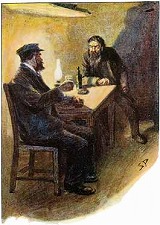“Well, I kept my knowledge to myself, and waited to see what would come of it. When we got back to Scotland it was easily hushed up, and nobody asked any questions. A stranger died by accident, and it was nobody’s business to inquire. Shortly after Peter Carey gave up the sea, and it was long years before I could find where he was. I guessed that he had done the deed for the sake of what was in that tin box, and that he could afford now to pay me well for keeping my mouth shut.

“I found out where he was through a sailor man that had met him in London, and down I went to squeeze him. The first night he was reasonable enough, and was ready to give me what would make me free of the sea for life. We were to fix it all two nights later. When I came, I found him three parts drunk and in a vile temper. We sat down and we drank and we yarned about old times, but the more he drank the less I liked the look on his face. I spotted that harpoon upon the wall, and I thought I might need it before I was through. Then at last he broke out at me, spitting and cursing, with murder in his eyes and a great clasp-knife in his hand. He had not time to get it from the sheath before I had the harpoon through him. Heavens! what a yell he gave! and his face gets between me and my sleep. I stood there, with his blood splashing round me, and I waited for a bit, but all was quiet, so I took heart once more. I looked round, and there was the tin box on the shelf. I had as much right to it as Peter Carey, anyhow, so I took it with me and left the hut. Like a fool I left my baccy-pouch upon the table.
“Now I’ll tell you the queerest part of the whole story. I had hardly got outside the hut when I heard someone coming, and I hid among the bushes. A man came slinking along, went into the hut, gave a cry as if he had seen a ghost, and legged it as hard as he could run until he was out of sight. Who he was or what he wanted is more than I can tell. For my part I walked ten miles, got a train at Tunbridge Wells, and so reached London, and no one the wiser.
“Well, when I came to examine the box I found there was no money in it, and nothing but papers that I would not dare to sell. I had lost my hold on Black Peter and was stranded in London without a shilling. There was only my trade left. I saw these advertisements about harpooners, and high wages, so I went to the shipping agents, and they sent me here. That’s all I know, and I say again that if I killed Black Peter, the law should give me thanks, for I saved them the price of a hempen rope.”
“A very clear statement,” said Holmes, rising and lighting his pipe. “I think, Hopkins, that you should lose no time in conveying your prisoner to a place of safety. This room is not well adapted for a cell, and Mr. Patrick Cairns occupies too large a proportion of our carpet.”
“Mr. Holmes,” said Hopkins, “I do not know how to express my gratitude. Even now I do not understand how you attained this result.”
“Simply by having the good fortune to get the right clue from the beginning. It is very possible if I had known about this notebook it might have led away my thoughts, as it did yours. But all I heard pointed in the one direction. The amazing strength, the skill in the use of the harpoon, the rum and water, the sealskin tobacco-pouch with the coarse tobacco - all these pointed to a seaman, and one who had been a whaler. I was convinced that the initials ‘P. C.’upon the pouch were a coincidence, and not those of Peter Carey, since he seldom smoked, and no pipe was found in his cabin. You remember that I asked whether whisky and brandy were in the cabin. You said they were. How many landsmen are there who would drink rum when they could get these other spirits? Yes, I was certain it was a seaman.”
“And how did you find him?”